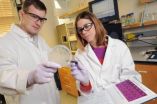(Press-News.org) In the most comprehensive report in a half century, experts today described fundamental changes needed in the education of the scientists whose work impacts medicine, drug discovery and virtually every other discipline. The result of a year-long project of a presidential commission of the American Chemical Society (ACS), the world's largest scientific society, the report was the topic of a symposium here at the 2013 annual meeting of the American Association for the Advancement of Science (AAAS).
Although it concluded that the state of graduate education in the chemical sciences is productive and healthy in many respects, the Commission report found that the education of doctoral-level scientists has not kept pace with major changes in the global economic, social and political environment that have occurred since World War II, when the current system of graduate education took shape.
Bassam Z. Shakhashiri, Ph.D., convened the panel, the Commission on Graduate Education in the Chemical Sciences, as one of his major initiatives as 2012 ACS president. The William T. Evjue distinguished chair for the Wisconsin Idea at the University of Wisconsin-Madison, Shakhashiri organized and moderated the symposium.
Five members of the Commission participated in the AAAS symposium, along with Shirley M. Malcom, Ph.D., head of Education and Human Resources at the AAAS. Speakers and their topics were:
Larry Faulkner, Ph.D., University of Texas
"Vision and Recommendations of the ACS Presidential Commission on Graduate Education in the Chemical Sciences"
Paul Houston, Ph.D., Georgia Institute of Technology
"The ACS Commission on Graduate Education in the Chemical Sciences: Recommendations of the Working Groups"
Geraldine Richmond, Ph.D., University of Oregon
"Graduate Education in the Chemical Sciences: The Graduate Student Profile"
George Whitesides, Ph.D., Harvard University
"Changing Graduate Education To Meet the Needs of Students and Society, Part 1"
Shirley M. Malcom, Ph.D., AAAS Education and Human Resources
"Changing Graduate Education To Meet the Needs of Students and Society, Part 2"
Gary Calabrese, Ph.D., Corning, Inc.
"Changing Graduate Education To Meet the Needs of Students and Society, Part 3"
"The time for a close look at the education of tomorrow's scientists in this key discipline was long overdue," said Shakhashiri. "We hope the Commission's work will create the best possible experience for future scientists upon whom society will depend so heavily to address the great global challenges facing us all. They include climate change, population growth, finite resources, malnutrition, spreading disease and water management."
The Commission found that:
Current educational opportunities for graduate students, viewed on balance as a system, do not provide sufficient preparation for their careers after graduate school.
The system for the financial support of graduate students, as currently operated by private, institutional, state and federal funds, is no longer optimal for national needs.
Academic chemical laboratories must adopt best safety practices. Such practices have led to a remarkably good record of safety in the chemical industry and should be leveraged.
Departments should give thoughtful attention to maintaining a sustainable relationship between the availability of new graduates at all degree levels and genuine opportunities for them. Replication in excess is wasteful of resources and does injustice to the investment made by students and society.
Postdoctoral training and education is an extension of graduate education that is important for success in a variety of career paths, particularly for faculty appointments. Postdoctoral associates should be treated as the professional scientists and engineers they are. A postdoctoral appointment should be a period of accelerated professional growth that, by design, enhances scientific independence and future career opportunities.
The Commission developed its recommendations to address several fundamental concerns. Graduate programs, for instance, must prepare Ph.D. candidates for the present and future marketplace of opportunity. Second, the globalization of science necessitates stronger communication skills across disciplinary and cultural lines. Third, as many nations worldwide have greatly strengthened their scientific capacity by building universities and developing new businesses and markets, it is essential for the U.S. to engage more women and students from underrepresented populations to revitalize the chemical enterprise with new ideas and energy.
###
ACS is a leader in science education policy. ACS serves as co-chair of the STEM Education Coalition. For a full discussion of additional policy points, please visit the ACS STEM education policy Webpage.
The American Chemical Society is a nonprofit organization chartered by the U.S. Congress. With more than 163,000 members, ACS is the world's largest scientific society and a global leader in providing access to chemistry-related research through its multiple databases, peer-reviewed journals and scientific conferences. Its main offices are in Washington, D.C., and Columbus, Ohio.
To automatically receive news releases from the American Chemical Society, contact newsroom@acs.org.
Follow us: Twitter Facebook
NOTE TO MEDIA: The American Chemical Society has many educational resources and programs. They include college scholarships for minority and economically disadvantaged students, summer research opportunities for undergraduates, teacher training and grants for high school chemistry teachers. These and other programs can be found at www.acs.org/education, www.acs.org/scholarships and www.acs.org/grants
END
From sore feet to backaches, blame it on human evolution.
"Because we are the only mammals to walk on two feet," says Bruce Latimer, an anthropologist from the Case Western Reserve University School of Dental Medicine.
Latimer will present "A Backache of Longstanding: An Evolutionary Perspective on the Human Vertebral Column" at the 2013 American Association for the Advancement of Science's annual meeting in Boston, Feb. 14-18. His talk will be featured in the session, "The Scars of Human Evolution."
Latimer and other panelists will explain how adapting to upright ...
BOSTON - The notion of "personalizing" health care through the use of an individual's genetic code has attracted considerable enthusiasm and investment. Impressive examples, confirmed through formal studies of clinical validity and utility, suggest that we have only scratched the surface of applications to treat disease more precisely, identify risk factors for complex disease, and guide preventative measures.
As the cost of sequencing entire genomes falls, the opportunities for people around the world to take possession of their entire genetic code will proliferate. ...
When it comes to healing the terrible wounds of war, success may hinge on the first blood clot – the one that begins forming on the battlefield right after an injury.
Researchers exploring the complex stream of cellular signals produced by the body in response to a traumatic injury believe the initial response – formation of a blood clot – may control subsequent healing. Using that information, they're developing new biomaterials, including artificial blood platelets laced with regulatory chemicals that could be included in an injector device the size of an iPhone. Soldiers ...
More people are meeting recommended goals in the three key markers of diabetes control, according to a study conducted and funded by the National Institutes of Health and the Centers for Disease Control and Prevention.
The report, published online February 15 in Diabetes Care, shows that, from 1988 to 2010, the number of people with diabetes able to meet or exceed all three of the measures that demonstrate good diabetes management rose from about 2 percent to about 19 percent. Each measure also showed substantial improvement, with over half of people meeting each individual ...
CHAMPAIGN, Ill. — Throughout 2012, the United States was battered by severe weather events such as hurricanes and droughts that affected both pocketbooks and livelihoods. Research suggests that in the coming years, U.S. five-day forecasts will show greater numbers of extreme weather events, a trend linked to human-driven climate change.
Donald Wuebbles, a professor of atmospheric sciences at the University of Illinois at Urbana-Champaign, will discuss extreme weather in a presentation Feb. 15 at the annual meeting of the American Association for the Advancement of Science ...
LA JOLLA, CA – February 15, 2013 – Doctors currently struggle to determine whether a breast tumor is likely to shift into an aggressive, life-threatening mode—an issue with profound implications for treatment. Now a group from The Scripps Research Institute (TSRI) has identified a mechanism through which mitochondria, the powerhouses of a cell, control tumor aggressiveness. Based on their findings, the team developed a simple treatment that inhibits cancer progression and prolongs life when tested in mice.
The research team, which describes its results February 15, 2013, ...
CHARLOTTE, N.C. –Feb. 14, 2013– The pharmaceutical industry's efforts to self-regulate its direct-to-consumer (DTC) advertising are "an industry-sponsored ruse," intended to deflect criticism and collectively block new Federal regulation, a study released today in the Journal of Health Politics, Policy and Law found.
The paper, "The Politics and Strategy of Industry Self-Regulation: The Pharmaceutical Industry's Principles for Ethical Direct-to-Consumer Advertising as a Deceptive Blocking Strategy," was written by Denis Arnold, Associate Professor of Management and Surtman ...
In our ongoing quest for alternative energy sources, researchers are looking more to plants that grow in the wild for use in biofuels, plants such as switchgrass.
However, attempts to "domesticate" wild-growing plants have a downside, as it could make the plants more susceptible to any number of plant viruses.
In a presentation at this year's meeting of the American Association for the Advancement of Science, Michigan State University plant biologist Carolyn Malmstrom said that when we start combining the qualities of different types of plants into one, there can be ...
(Boston) – A breast cancer risk prediction model developed for African Americans tends to underestimate risk in certain subgroups, according to a new study from the Slone Epidemiology Center (SEC) at Boston University. The model predicted estrogen receptor (ER)-negative breast cancer, which is a more aggressive form of breast cancer that disproportionately affects African American women, more poorly than ER-positive breast cancer.
The study, published online today in the Journal of the National Cancer Institute, was led by Deborah Boggs, ScD, postdoctoral associate at ...
HEIDELBERG, 15 February 2013 – Researchers from King's College London have discovered that neuronal activity can stimulate tau release from healthy neurons in the absence of cell death. The results published by Diane Hanger and her colleagues in EMBO reports show that treatment of neurons with known biological signaling molecules increases the release of tau into the culture medi-um. The release of tau from cortical neurons is therefore a physiological process that can be regulated by neuronal activity.
Tau proteins stabilize microtubules, the long threads of polymers ...


